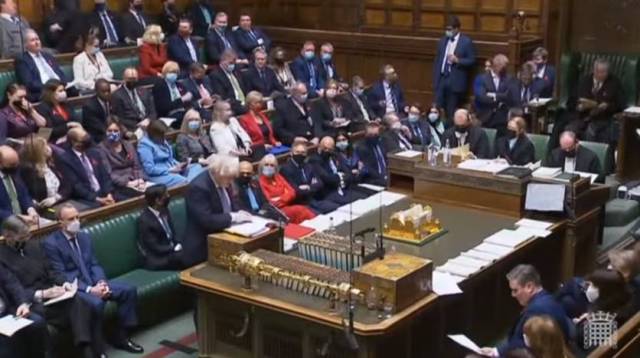 Prime Minister Boris Johnson at Prime Minister's Questions in parliament. [source: UK Parliament]
Prime Minister Boris Johnson at Prime Minister's Questions in parliament. [source: UK Parliament]
Most governments reach a point when observers ask whether public opinion is turning against the politicians in power. Many analysts are wondering whether Boris Johnson has reached that stage after a torrid few weeks for the prime minister and his Conservative party.
As Christmas nears, Johnson might have expected to be basking in the diplomatic glow from hosting the crucial UN climate summit in Glasgow, Cop26. Instead, he found himself beset by newspapers asking if ‘cracks are beginning to show in his freewheeling political style’. After his rambling speech to the powerful CBI business organisation, which included references to the children’s TV character Peppa Pig, making car noises and a long silence after he lost his place, Johnson was asked by a reporter: ‘Frankly, is everything OK?’. A Downing Street spokesman had to deny Johnson was unwell and insist he had not lost his grip.
In October the government ended a temporary rise in Universal Credit welfare payments, which helped 3.6 million families through the pandemic. The £20-a-week cut, combined with rising inflation and higher energy bills, was criticised for taking 10% of 1m households’ income. Shortly afterwards, as the Conservative lobbying scandal grew, and 114 Tory MPs, and 20 Labour ones, turned out to have second jobs, one backbencher complained that £82,000 a year plus expenses was not enough to live on.
The first scandal came when Owen Paterson, a former Conservative minister, was censured for breaking parliamentary rules banning MPs from paid advocacy for companies. Johnson infuriated his MPs by forcing them to support a controversial amendment scrapping the Commons’ anti-corruption rules to protect Paterson, then withdrawing his backing after an angry backlash from usually docile pro-Tory newspapers. The government eventually endorsed the report finding him guilty and scrapped plans for a new standards body. Paterson quit politics.
Following that scandal came news that the former UK attorney-general Geoffrey Cox had earned £5.9m elsewhere while an MP. Of particular interest was his legal work for the British Virgin Islands’ premier, Andrew Fahie (the British Oversea Territory’s governor had appointed a British judge to investigate corruption allegations against the BVI government). As pictures of the luxury Caribbean villa Cox was staying in, while ostensibly working as an MP for Devon (and even voting from the BVI), appeared, Johnson felt obliged to declare that ‘the UK is not remotely a corrupt country.’ Cox said his work for the BVI authorities was ‘not to “defend” a tax haven or, as has been inaccurately reported, to defend any wrongdoing but to assist the public inquiry in getting to the truth’. He said he would submit to the parliamentary standards watchdog’s ruling over whether he had breached the rules.
Another former minister, Ian Duncan Smith, was accused of a ‘brazen conflict of interest’ when it emerged that the former Tory leader had chaired a government taskforce that recommended new rules benefiting the firm employing him. (He denies any wrongdoing.) Among other Tory MPs’ outside interests, Daniel Kawczynski was found to have been paid £258,000 as a mining company consultant while also a UK trade envoy to a country with significant mineral deposits. (He denies any wrongdoing.)
Meanwhile, Private Eye found that the Conservative government’s plan in 2013 to streamline the NHS led to emergency supplies being run down – until Covid-19, when the government splurged £14bn on personal protective equipment (PPE) contracts with a few well-connected companies and little scrutiny of costs. There was an ‘average five-fold increase from pre-pandemic prices’, the magazine found, noting that three executives at one supplier shared £64m profit from one contract. (They deny any wrongdoing.) The PPE bonanza only happened because the government ignored the conclusions of Exercise Alice in 2016, which tested the UK response to a coronavirus pandemic like Sars, and outsourced management of its emergency PPE stockpile, Private Eye said.
Rounding off an embarrassing few weeks for the prime minister were revelations by his former lover Jennifer Arcuri, in which she alleged that Johnson overruled his advisers while London mayor to promote her business interests. The claims leave Johnson open to facing a potential criminal investigation into misconduct allegations, the Observer reported. Meanwhile, the government’s attempt to blame France after 27 migrants drowned trying to cross the Channel only worsened the UK’s strained relations with its EU neighbours. And, as Omicron – potentially the most infectious Covid-19 variant yet – spread, Johnson was accused of ignoring plans to prepare Britain for new vaccine-resistant strains.
Opinion polls suggest the sleaze, both alleged and proven, and the impression of a government adrift, have cut through to the public: Labour were two percentage points clear, whereas only six months ago the Tories had been ahead by 18 points.
Johnson has proven adept at gauging the public mood (or as the Tory grandee Michael Heseltine waspishly put it, ‘a man who waits to see the way the crowd is running and then dashes in front and says, “Follow me”’) and his winning ways at the ballot box ensured he has a solid majority of 77 behind him in the Commons. But his personal approval rating has not been in positive territory since February and is now at -35%. His own MPs, many of whom owe their seats to his campaigning flair at the 2019 election, have made their feelings known by opting not to attend prime minister’s questions. For all his success, the politician who wanted to be ‘world king’ as a boy may find his all too human foibles leave him stranded. The Conservative party has won over the centuries because it is ruthless about staying in power – even Margaret Thatcher was unceremoniously ditched when she became a liability. As one senior Tory said recently: ‘In politics, nothing matters – until it does.’



